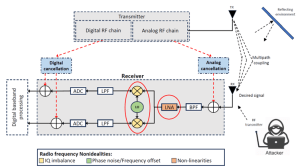Our spotlight blog series aims to highlight the work of our research team across the SWAN Prosperity Partnership, showcasing the contributions of our post-doctoral researchers, PhD students, academics, and industrial partners.
In our latest blog, we spoke to Senior Research Associate Francesco Raimondo, who joined SWAN in November 2022 after working on an aligned project, with colleagues at Toshiba and the University of Bristol. Francesco walked us through some of his recent research on improving the reliability of Internet of Things (IoT) systems through the development of resilient and secure Radio Frequency (RF) receivers.
 What are your main research tasks within SWAN and how do these relate to your previous research experience?
What are your main research tasks within SWAN and how do these relate to your previous research experience?
In the SWAN project we investigate different wireless technologies, such as mobile communications and IoT (long and short distance), looking at the security threats potentially affecting the communication services. Considering the communication layers model, we are focused mainly on the physical layer. Part of my research effort is spent on IoT technologies, such as LoRa and NB-IoT.
I also work on improving the performance of RF transceivers, under severe interference conditions. I develop solutions and verify them both through simulations and in real deployments. I have worked in the past on designing embedded communication systems and I hope my experience will be useful for the project.
Can you give us a brief overview of the work you have been doing recently and how this relates to the SWAN Prosperity Partnership?
I am looking at developing more resilient RF receivers. Performance can be lowered both by external interferences and non-ideal behaviours of the RF equipment. One example of external interference is a malicious signal jamming of the radio equipment under attack. Digital signal processing techniques can be applied to mitigate the interference. Improvements in RF data converters allow us to acquire and process a much larger bandwidth compared to the past 10 years. This encourages us to spend our effort not only on the analogue but also on the digital side of the RF transceivers.
Where does this work fit in with SWAN’s wider Research Challenges?
My work fits with the challenges related to RF architectures that are more resilient to attack, facilitating the detection of adversaries and offering energy- and cost-efficient RF reconfigurability for defensive countermeasures.

What will be the key outputs of this particular piece of work?
Effort will be spent to produce a research paper and encourage knowledge sharing in the SWAN team. We will also build a resilient RF demonstrator, by use of recent RF digital platforms based on Field Programmable Gate Arrays (FPGAs) and Digital Signal Processors (DSPs). The equipment available in the CSN laboratory allows us to conduct realistic experiments, to understand limitations not usually visible in a simulated environment.
How have SWAN’s partners in industry and government been involved in this work package?
During the past months, a series of workshops and meetings offered the opportunity to share our research interests and priorities. Common points of interest have been found, also related to my research tasks. We collaborate with the SWAN Partners, collecting new ideas and feedback, essential for improving the quality of our research outputs.
What are the next steps for this section of research?
Currently we are designing a blocker cancellation solution, that will initially be proved in MATLAB. Next steps will focus on setting up a testbed in the laboratory to evaluate the effectiveness and performance.
Can you tell us about any recent publications in the world of communication systems and networks research that have interested you?
1) Balatsoukas-Stimming, A., Austin, A.C., Belanovic, P. et al. ‘Baseband and RF hardware impairments in full-duplex wireless systems: experimental characterisation and suppression’. J Wireless Com Network 2015, 142 (2015). https://doi.org/10.1186/s13638-015-0350-1.
2) J. Marttila, M. Allén, M. Kosunen, K. Stadius, J. Ryynänen and M. Valkama, "Reference receiver enabled digital cancellation of nonlinear out-of-band blocker distortion in wideband receivers," 2016 IEEE Global Conference on Signal and Information Processing (GlobalSIP), Washington, DC, USA, 2016, pp. 684-688, doi: 10.1109/GlobalSIP.2016.7905929.
Is there anything else you would like to tell us?
I am excited to be learning new methodologies and solutions, collaborating with colleagues across the Prosperity Partnership and contributing towards the project’s outcomes.
SWAN Prosperity Partnership
SWAN is an EPSRC Prosperity Partnership project dedicated to the creation of Secure Wireless Agile Networks (SWAN) that are resilient to both cyber attacks and accidental or induced failures. The partnership is made up of contributors from the Smart Internet Lab at the University of Bristol, Toshiba Research Europe Ltd, GCHQ, and Roke Manor Research Ltd.
Interested in reading more about SWAN and our programme of research? Take a look at our website for more information or sign up to our newsletter for regular updates on SWAN activities and opportunities to get involved.
